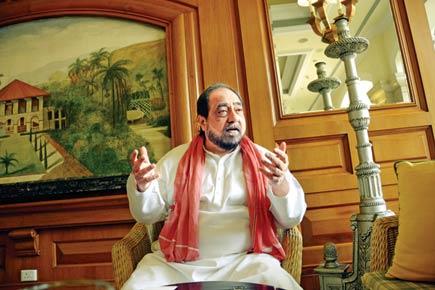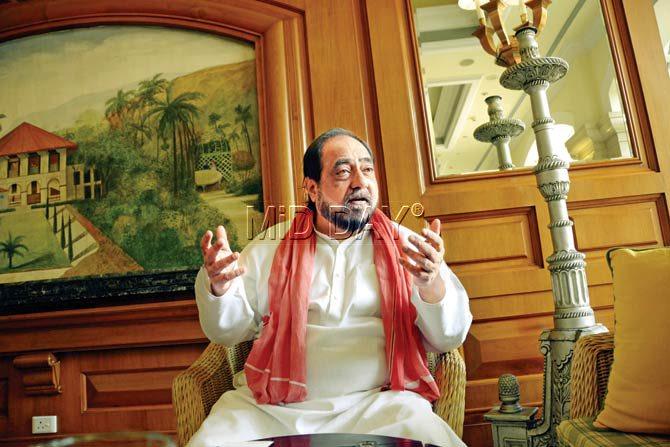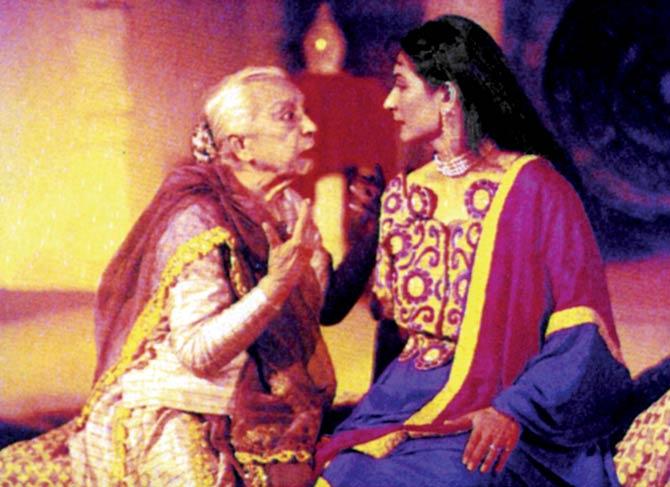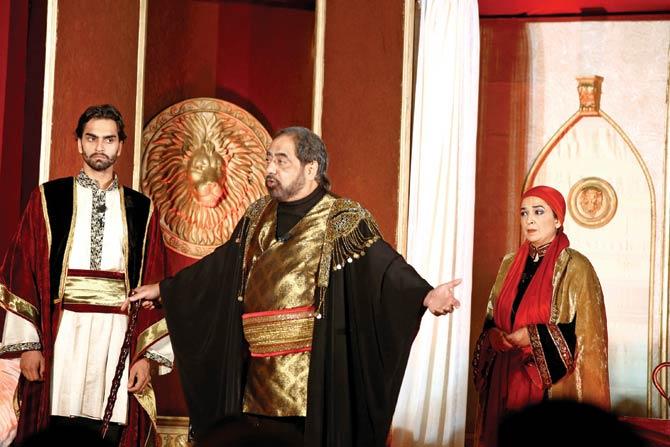Legendary theatre artiste Aamir Raza Husain, who has been at the forefont of path-breaking stage productions, lifts the curtain on all things theatre

![]() Everybody loves a good story, and Aamir Raza Husain has many. Sitting in a central Mumbai five-star, he settles into story time, telling us of making his nine-month-old daughter cry naturally on stage, for 45 days, years ago. “Had we been in the US, the child services might have arrested us!” he laughs. His second story is about helping a Kargil war veteran win a medal at the Paralympic Games.
Everybody loves a good story, and Aamir Raza Husain has many. Sitting in a central Mumbai five-star, he settles into story time, telling us of making his nine-month-old daughter cry naturally on stage, for 45 days, years ago. “Had we been in the US, the child services might have arrested us!” he laughs. His second story is about helping a Kargil war veteran win a medal at the Paralympic Games.
ADVERTISEMENT

Aamir Raza Husain is in Mumbai for the staging of his production, The Lion in Winter. Pic/Pradeep Dhivar
“When I did Legend of Ram in Delhi, it was a big show. But Bombay didn’t hear about it. The Fifty-Day War (1999) ran for six months in Delhi and Bombay; 700 people watched it every day. Delhi was much closer to the war. Bombay was insulated by the stock market; they didn’t know what was happening in Kargil,” he says. Chhagan Bhujbal was Maharashtra’s deputy chief minister, was in Delhi, where common friend, politician Pramod Mahajan suggested that he watch the show, after which Bhujbal requested Husain to bring it to Bombay. The audience reaction he tells us was greater because the city had a feeling of guilt. “At each show, an injured soldier from Kargil would be the chief guest. We would get them jobs or provide them with help like their child’s wedding. One such young soldier had lost his leg in a landmine. He was fitted with a heavy artificial leg, which was painful. He knew of an artificial leg from Germany that cost between '2-2.5 lakh. For the show where he was chief guest, we managed to raise money for five such prosthetic limbs! The help from Mumbai was unlike elsewhere. He won a bronze medal and subsequently, a silver with that leg in the Paralympics,” recalls Husain.

The late Zohra Sehgal in a scene from The Legend of Ram, Prince of India
Act 1: First day, first show
Husain is in the city for the performance of the classic, The Lion In Winter, co-directed with his, Virat. Their daughter Sukaina, looks after controls, sound and light and acts a bit too. “I like to think I am not strict but they (his son, Ghulam Ali Abbas and daughter) feel I am far stricter than any parent they know. I don’t work with them. Sukaina likes to write; she would tell me that she isn’t keen to act. She did a bit role for a play staged in Pune last year, and liked it. Now she looks for more small roles (laughs). I said, I give you permission but I am not involved in this decision. I am strict with my actors, so, I don’t get involved with my kids. Less stress!” he chuckles.

Aamir Raza Husain (centre) and wife Virat Husain (right) in a scene from The Lion in Winter
The play was first performed 32 years ago. Husain has been touring with the play across India since September last year, but this is the first time it has come to Mumbai. While his booming voice conceals the jitters, he admits he still gets butterflies before a show. “If you are not excited, you cannot convey it to the audience. Audiences across the globe can gauge your personality. If you are pompous, it reflects in your performance, and the audience won’t like it. It can kill your performance.”
Act 2: Mumbai vs Delhi
Husain loves Delhi, and doesn’t hide it. “Somewhere between Bombay being given in dowry to the British by the Portuguese and the arrival of a right wing government, the city has lost its soul. The Parsi and English theatre of yore, the music of yore is being replaced by people who don’t have a universal imagination and upbringing; they see English and they think, ‘horrible!’. They see Ghulam Ali and say, ‘Oh! Enemy territory’.
They can’t see culture. In Delhi, they still appreciate it. Delhi has a long history; there are monuments, which this city lacks. There is a tradition of food, which is maintained. The Ganga-Jamuni tehzeeb comes from Delhi, where the baniya and the Muslim mingled in Chandni Chowk to give it culture and flavour. A dilution has happened because of migration; but they have enclaves where their culture flourishes, adding to Delhi’s character. The character of Bombay that is emerging is that of a city without a soul. The culture of the fisherfolk has been trampled on,” he tells us sombrely.
Politics, he feels, acts as catalyst: “Political parties are pandering to the interest of different social groups here. In Delhi, whoever is the head — whether it was Sheila Dixit who ruled for 15 years or Arvind Kejriwal who is ruling now — is aware of their duty to maintain the city’s heritage. Here, everything that doesn’t agree with the political dispensation is not part of the city.” Husain, who has been a member of the BJP prefers to stay away from the hoopla and concentrate on his work. “There was a time when I was doing everything. Today, I don’t get involved. I don’t sell tickets either. I don’t think of the government, licence or any other crap. I hate learning lines (for my play); it stresses me. If I had to get my licences on top of it too, I would go nuts,” he states.
But all isn’t lost for Mumbai; he feels it’s a good city for theatre, thanks to its geography and cheaper advertising. “If your play opens at Tata Theatre, it travels through the halls in the city till Andheri; a play can survive here for six months, even a year. In Delhi, there is only one district where a play will run for 10 days, and you are over.”
Act 3: Grand old days
Today, Husain directs smaller plays for invite-only audiences but people still remember his large-scale productions The Legend of Ram, The Fifty Day War and Saare Jahaan Se Achcha. While he might be eager to recreate the grandeur, economy is not on his side. “Today, nobody has the money (to fund large scale productions). Theatre and dance are at the bottom of priority. In case of budget cuts in companies, we are the first to go. During the Atal Bihari Vajpayee and Narasimha Rao eras, the economy was going berserk, and money poured in. Theatre cannot stand on its own feet today. Small plays are difficult to fund, forget about big productions.”

Aamir on Virat
“We have the same vision. Virat had trained with me initially. And now she has taken off on her own, which is hell of a lot, happily for us. Otherwise, we couldn’t work. We look at getting the same reaction from an audience. We both know where we have to go and the kind of production we have to put together.”
 Subscribe today by clicking the link and stay updated with the latest news!" Click here!
Subscribe today by clicking the link and stay updated with the latest news!" Click here!






